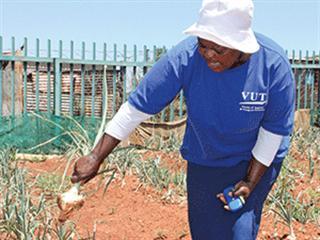Since February 2011, he has been quoted regularly as saying the impermeable layers of rock between the shale gas and groundwater would prevent any contamination. At the beginning of June, he started saying something completely different. Van Tonder is a geo-hydrologist at the University of the Free State’s Institute for Groundwater Studies.
“I am now 100% sure that fracking fluids will contaminate the groundwater,” said Van Tonder. “Some of it may happen very slowly. But what is very worrying is that because of dolerite sills and dykes – natural pathways for water – the contamination could happen within months or even weeks. South Africa has the only shale field in the world with dolerite in it. This is the wild card.”
His latest studies and models show that water in the Karoo flows constantly upwards. ‘‘We see constant proof of that in the hot water springs of Aliwal North, Cradock and others, bringing water from the deeper Karoo layers to the surface,’’ he said. The deep boreholes drilled by Soekor and the deep drilling by the gold mining industry show the same pattern, according to Van Tonder.
“The facts were before us all the time. Someone should have picked it up before, but I’m proud that I did. I freely admit now that I made mistakes in the past.” His change of heart came after a remark from a US hydrologist who spoke of the Marcellus shale fields’ worrying vertical flow of water.
“That reminded me of the exploration holes drilled by the gold companies on my father’s Free State farm. Water rose up in them and was still warm at the surface.” Another trigger for the mindset change was the revelation of the sheer scale of Shell’s planned well pads.
A study by Van Tonder and doctoral student Fanie de Lange notes: “A possible 17 300 well pads implies at least 173 000 boreholes and each of these boreholes must be considered a potential preferred pathway for fracking chemicals, diluted formation elements and methane.”
Van Tonder and De Lange concluded that: “Under no circumstances must the companies be allowed to include any hazardous chemicals in the fracking fluid. There are other more green options available.” Shell spokesperson Janine Nel said the study had been passed on to its technical team for review, and might take weeks. Mandla Mathebula, spokesperson for the Minister of Water and Environmental Affairs, Edna Molewa, said: “We need more time to examine this study before giving comment.”












